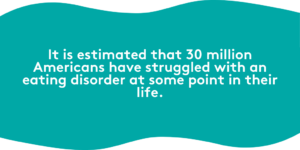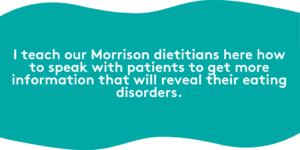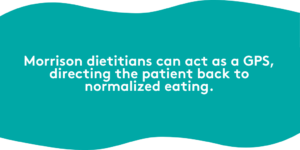How I’m Helping Patients Fight Eating Disorders
By Leslie Ely, Registered Dietitian, Baptist Memorial Health Care in Memphis
It’s often not easy to diagnose an eating disorder. People don’t readily discuss their weight and eating habits, nor often recognize the symptoms. Without some probing, dietitians can often miss a patient with an eating disorder.
With a passion for building long-term relationships with patients, I’ve been helping people with eating disorders for six years. I found my calling shortly after graduating from Mississippi State University and working at a treatment center for people with eating disorders. Now, working in a large general hospital, I strive to work with all of my patients and help them reclaim their relationship with food.
I recall speaking years ago with a patient and didn’t recognize that she was anorexic until I asked a few simple questions. It turned out that she had multiple “food rules” – reasons she would not eat certain foods – and she ate the same food every single day. When I questioned her low weight, she revealed she had been struggling with anorexia for many years.
One of the first signs someone may have an eating disorder is when they have several rules about foods they won’t eat. For example, they may not consume sugar and often avoid or don’t understand the role of carbohydrates. This particular woman followed a strict nutrition and exercise pattern. She was also worried about eating hospital food; not eating food prepared by others is another warning sign of an eating disorder.
What is an Eating Disorder?
According to U.S. Health News, it is estimated that 30 million Americans have struggled with an eating disorder at some point in their life. For most people, eating too much or too little is a way of coping with other difficult issues in their lives. They may binge eat or consume too much comfort food to placate stress at work or soothe their concerns over other problems. In other cases, they may suffer from anxiety and depression and decide to work out their problems by exercising too much.

How Do Morrison Dietitians Reach These Patients?
Before joining Morrison Healthcare three years ago, I worked at a facility specializing in treating people with eating disorders. These patients are smart; they read a lot about their problems, and while they are sometimes misinformed, they know a lot about nutrition. They will test a dietitian’s knowledge and challenge your expertise.
These patients will ask to have their meal plan changed from the one I prescribed because they fear sometimes foods will harm them. I speak with them about getting the right nutrition from the food I ordered for them. Many will fight back, so I’ve gotten pretty good at saying “no” when they do.
I teach our Morrison dietitians here how to speak with patients to get more information that will reveal their eating disorders. They won’t open up during a routine visit unless we ask more probing questions and become more empathetic.
I have also joined the Morrison Healthcare behavioral health specialty committee in hopes of providing many dietitians with the resources they need to feel comfortable discussing eating disorders. Look for the webinar in May 2020!

Here’s How You Can Help
If you suspect someone is suffering from an eating disorder, there are several warning signs:
- Do they worry about losing control over how much they eat?
- Does food dominate their daily activities? Do they have any forbidden foods?
- Do they exercise too much? – feeling as if they have to compensate for what they are eating.
- Do they make themselves sick after eating a full meal? Ask if they vomit, takes laxatives, diet pills, diuretics or other medications.
The risk factors for developing an eating disorder can involve a range of biological, psychological and sociocultural issues. They may have a close family member with an eating disorder or have a history of dieting. Others are consumed with having a “perfect” body weight. This is where Morrison dietitians can act as a GPS, directing the patient back to normalized eating.

Here are signs to make sure a patient hasn’t moved into eating disorder territory:
- They spend excessive amounts of time planning meals/food intake.
- They feel guilty if they don’t follow “the plan.”
- Their weight gains cause them to feel like a failure and they think everyone is concerned about their weight.
- They believe all will be better once they reach their “goal weight.”
- They avoid social gatherings because of food.
These red flags can help open the door to discussions that could help motivate change, acting as your “road map” for goals and nutrition insight. Working with a patient with an eating disorder can be complex and challenging, but by knowing the warning signs and developing a strong support team, as we have here at Morrison, we can help more people get back on track.


